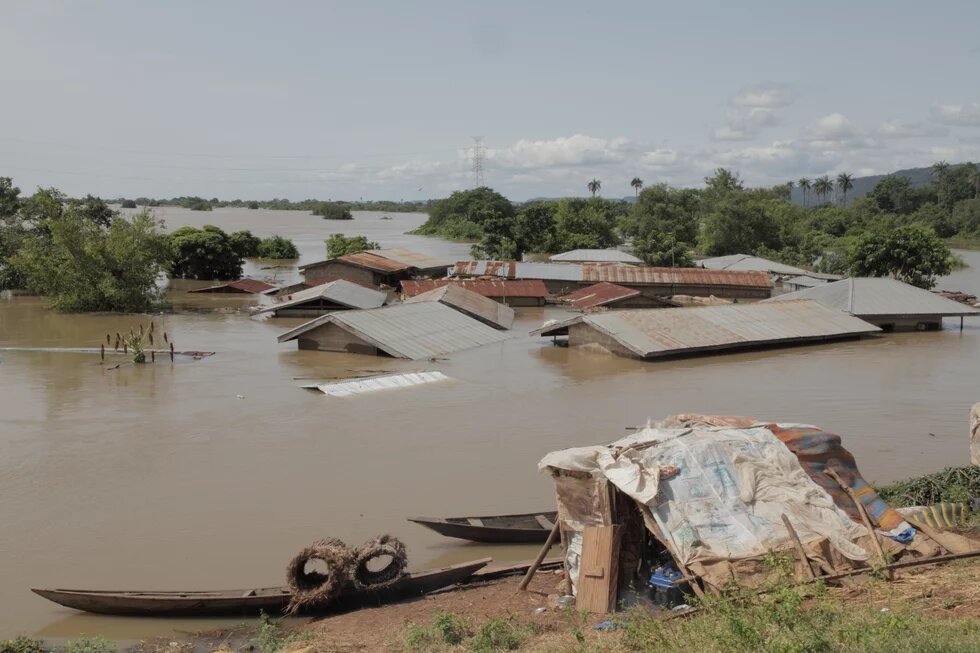
By Yusuf Haliru
Many communities and farmlands were submerged during the historic floods in September 2012. The devastation did not only take lives and displace people; it also threatened the very existence of the survivors as well as those who were not directly affected, as farmlands got submerged, crops and livestock were washed away and some completely destroyed. The floods significantly affected agriculture all the way down the value chain. In the face of these challenges, what is the fate of the Nigerian farmer, and what is the hope for food security? Who cares to absorb the shock of the farmers after such devastating losses? With more than 60 per cent of Nigerians working in the agricultural sector - most of them in small scale farming - what support can Nigerian farmers fall back on? Is there a safety net? What knowledge does the Nigerian small scale farmer have on agricultural insurance?
A few months before the floods, the Heinrich Boell Foundation commissioned a study on the economic importance and accessibility of agricultural insurance, especially for female subsistence farmers. In addition to the study, two test cases were conducted with NGOs and farmers’ groups in Jigawa and Ondo State to check on farmers’ general knowledge of and access to agricultural insurance. The assessment was done by use of questionnaires, collection of secondary data and literature from stakeholders, through one on one discussions with the farmers as well as site visits to the Nigerian Agricultural Insurance Company (NAIC) offices in the states. One farmer each was nominated from a male and female farmers’ cooperative for the pilot exercise. By accompanying the farmers through the process of applying for agricultural insurance, the test cases were able to document the weaknesses in the system and formulate recommendations (contained in the test case reports - DD1 and ASSAPIN).
All three assessments showed that the farmers had little or no knowledge about agricultural insurance, the NAIC processes, time frame, documentation requirements, procedures for application and even the location of the NAIC offices in their states. Most of the farmers who had some knowledge about the NAIC insurance scheme were those who had benefitted from the Bank of Agriculture (BOI) or the Nigerian Agricultural Cooperative and Rural Development Bank (NACRDB) loan schemes which require agricultural insurance cover as a pre-condition for granting a loan. The majority of farmers consulted during the study expressed a lot of scepticism about the scheme. They were of the opinion that going by the experience of some farmers, claims were not usually settled by the insurance agency despite insured farmers suffering losses.
Mr. Ogunmefun, a farmer from Ijebu-Ode shared his painful experience of suffering losses. Despite being insured he did not get compensation, but he accepted that his pain and frustration was caused by his ignorance of how the scheme worked: he had failed to submit his claim according to the procedures laid out by NAIC, because he had not been aware of them. The tests also revealed that inspite of women’s major contribution to agriculture, they are highly disadvantaged in several areas relating to access to resources and actualisation of opportunities. For some female farmers, their low level of education had limited their knowledge and understanding of the insurance process. Their interaction with both the insurance agencies and the lending institutions was usually done through male members of their communities. There was also a misconception of insurance as a religious taboo in Islam. Other challenges included the fact that NAIC had only one office per state.
The test cases allowed farmers to gain firsthand experience, which they passed on to other members of their farming groups. In the end, there was a general consensus among the participants that the agricultural insurance scheme could be of immense benefit to small scale farmers especially given the risks and uncertainties associated with agricultural enterprises. They hoped that the NAIC agency would be sincere and more committed towards meeting their obligations and sensitising farmers on the scheme; that the NAIC office would be brought closer to the communities; that female farmers be allowed by the community to participate; that religious clerics, community heads and opinion leaders be involved to debunk the taboo notion.
Agricultural insurance in the face of severe climatic changes needs to be liberalized through the amendment of the Nigerian Agricultural Insurance Corporation Act No. 37, for more commercial companies to enter the market and offer competing insurance products that will provide additional protection for the enterprise of the small-scale producers especially the female gender.
There is need for the immediate building of capacity within private insurance companies, which are currently not carrying agricultural risks but are expected to enter the market in the future with appropriate technical competence and general skills in the knowledge of agricultural projects and how to insure the associated risks. Other recommendations by the study included:
- Better government participation,
- Extension of tax holiday being enjoyed by NAIC since its inception to all new entrants over a pre-determined period (for all income accruing from agricultural insurance),
- Development of strong inter-stakeholder collaboration and exchange of ideas on the development and expansion of agricultural insurance for the benefit of subsistence farmers from areas that are currently within the coverage of existing reliable weather stations and immediate commencement of an aggressive expansion of Nigeria’s weather-monitoring capacity by government,
- Mainstreaming of agric insurance awareness and education policies nationwide with focus on small scale farmers and women,
- Donor agencies frequently giving grants to women farmers/cooperative societies should also be encouraged to include agricultural insurance in their packages to farmers and cooperatives.